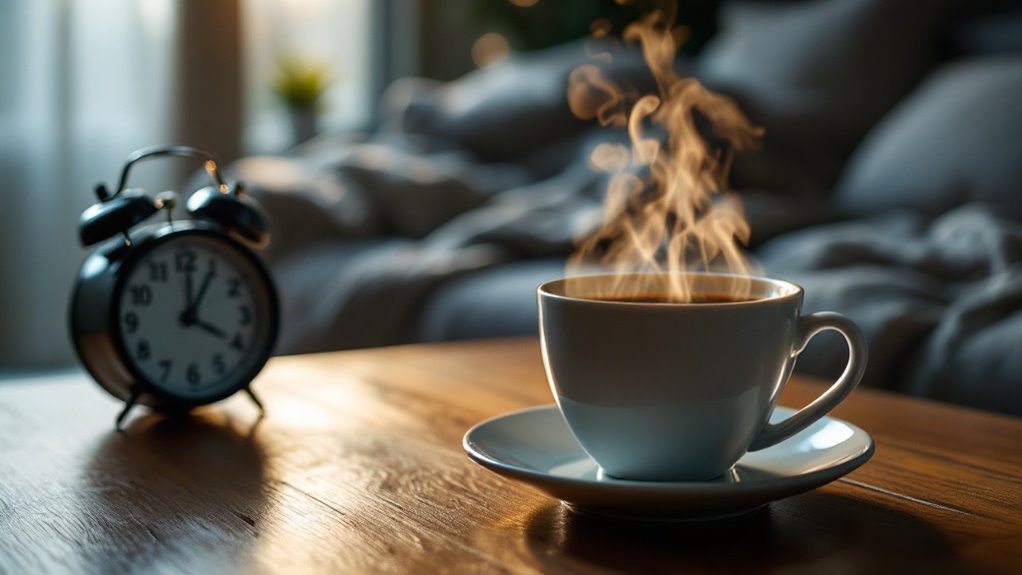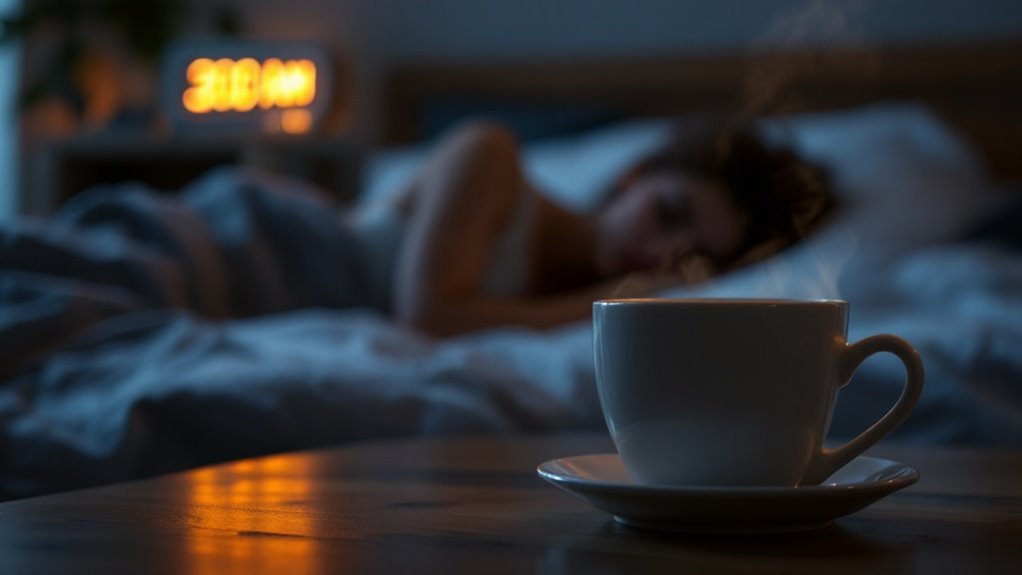



You might think that late-afternoon coffee won't affect your sleep, but caffeine lingers in your system longer than you'd expect. It blocks adenosine, a chemical that signals tiredness, and can delay your ability to fall asleep or reduce the quality of your rest. Even if you don't feel wired, your body might still be processing caffeine hours after your last sip. The timing and amount matter, but so do individual factors like metabolism and tolerance. So, how much is too much, and when should you cut yourself off? The answers might surprise you—and change your nighttime routine.
Key Takeaways
- Caffeine in coffee blocks adenosine receptors, delaying sleep onset and reducing deep, restorative sleep stages.
- Consuming coffee six hours before bedtime reduces total sleep time by 41 minutes and increases nighttime wakefulness.
- Caffeine's half-life of 5 hours means its effects linger, disrupting sleep patterns even hours after consumption.
- High caffeine intake lowers sleep efficiency and reduces REM sleep, diminishing overall sleep quality.
- Avoiding caffeine at least 8 hours before bedtime minimizes its disruptive effects on sleep patterns.
How Caffeine Affects Sleep Quality
Caffeine disrupts sleep quality by blocking adenosine receptors, which reduces deep, slow-wave sleep and delays sleep onset. By interfering with adenosine, a neurotransmitter that promotes sleepiness, caffeine keeps you alert but compromises your ability to fall asleep quickly. Even small amounts consumed in the afternoon can impair sleep quality, with 88% of individuals reporting sleep problems. Consuming caffeine six hours before bedtime reduces total sleep time by 41 minutes and increases wake time during sleep by eight minutes. When taken three hours before bed, it increases wake time by 27.6 minutes and lowers sleep efficiency. Chronic use disrupts the sleep-wake cycle, creating a dependency on caffeine for daytime alertness while perpetuating sleep deprivation. These caffeine effects on sleep also reduce REM sleep, further diminishing restorative rest.
The Science Behind Caffeine and Adenosine
Although adenosine plays a critical role in regulating sleep, caffeine interferes with this process by blocking its receptors in the brain. Adenosine accumulates throughout the day, binding to receptors and signaling your brain to prepare for sleep. Caffeine, structurally similar to adenosine, competes for these receptors but doesn't activate sleep-inducing pathways. By blocking adenosine's binding, caffeine delays the onset of sleep signals, keeping you alert and awake. This disruption can prevent your brain from recognizing the natural buildup of adenosine, especially if caffeine is consumed late in the day. Over time, this interference can alter your sleep patterns, making it harder to fall asleep or stay asleep. Understanding this mechanism highlights how caffeine's effects on adenosine receptors directly impact your sleep-wake cycle.
Optimal Timing for Coffee Consumption
Morning coffee consumption can enhance alertness and cognitive performance, aligning with your body's natural cortisol peak. However, consuming caffeine in the evening poses significant risks, as it can delay sleep onset and reduce total sleep time by up to 41 minutes when consumed within 6 hours of bedtime. To minimize sleep disruption, you should aim to cut off caffeine intake by mid-afternoon, adjusting based on your individual metabolism and sensitivity.
Morning Coffee Benefits
When consumed in the morning, coffee can markedly enhance alertness and cognitive performance, as caffeine reaches peak levels in the bloodstream within 30-60 minutes after intake. Morning coffee aligns with your body's natural cortisol peak, typically occurring between 8-9 a.m., which maximizes its energizing effects without disrupting circadian rhythms. By consuming caffeine before 10 a.m., you minimize interference with sleep onset, as its half-life of 4-6 hours allows most of it to metabolize by bedtime. Studies show that caffeine stimulates dopamine release, improving mood and productivity. This early-day intake supports sustained focus and mental clarity, making it an effective tool for enhancing daily performance. Timing your morning coffee strategically guarantees its benefits without compromising sleep quality later in the day.
Evening Caffeine Risks
Evening caffeine consumption poses substantial risks to sleep quality, as its effects can persist long after intake. Consuming caffeine in the afternoon, even 6 hours before bedtime, can reduce total sleep time by over an hour and increase nighttime wakefulness. Its half-life of 4–6 hours means caffeine remains active in your system when going to bed, delaying sleep onset by up to 40 minutes and lowering sleep efficiency. Studies show that 88% of individuals who consume caffeine in the afternoon experience sleep disruption, including difficulty falling asleep or reduced sleep quality. To minimize these effects on sleep, avoid caffeine at least 8 hours before bedtime, with some needing to stop by early afternoon. Timing matters—late consumption markedly heightens evening caffeine risks.
Caffeine Metabolism and Individual Differences
While caffeine's effects on sleep are influenced by its half-life, which ranges from 1.5 to 12 hours, individual differences in metabolism play a critical role in determining its impact. Genetic factors, particularly variations in the CYP1A2 gene, substantially affect caffeine metabolism. If you carry a slow-metabolizing variant, caffeine lingers longer in your system, increasing its potential to disrupt sleep. Nicotine use accelerates caffeine metabolism, reducing its half-life by up to 50%, while pregnancy slows it down, doubling the time caffeine remains active. These individual differences mean your response to caffeine may differ from others, even at the same dose. Tracking your intake and sleep patterns can help you identify how caffeine affects you personally, allowing you to adjust consumption to minimize sleep disruption.
Safe Daily Caffeine Limits for Adults
The FDA recommends a maximum daily caffeine intake of 400 milligrams for healthy adults, though individual tolerance levels vary due to genetic and metabolic factors. Caffeine content in beverages like coffee can differ substantially, so you should account for these variations when tracking your intake. Exceeding this limit may increase your risk of side effects, including disrupted sleep patterns.
FDA Recommended Maximum
Although caffeine is widely consumed, the FDA advises healthy adults to limit daily intake to no more than 400 milligrams, roughly equivalent to 4-5 cups of coffee. The Food and Drug Administration (FDA) established this guideline to help adults to consume caffeine safely and avoid adverse effects of caffeine, such as insomnia, jitteriness, or elevated heart rate. Exceeding 400 mg of caffeine per day increases the risk of these symptoms. Pregnant individuals should further restrict intake to 200 mg daily to mitigate potential risks. Energy drinks and supplements often contain high caffeine levels, so you should monitor your total daily caffeine from all sources to stay within the FDA's recommended limit. Adhering to these guidelines helps minimize health risks while allowing you to enjoy caffeine responsibly.
Individual Tolerance Levels
Since caffeine affects individuals differently, your tolerance level plays a significant role in determining a safe daily limit. Your ability to metabolize caffeine depends on factors like genetics, body weight, and liver enzyme activity. Some people may experience effects on sleep with as little as 200 milligrams of caffeine, while others tolerate higher doses without disruption. Regular caffeine consumption can increase your tolerance, requiring more to achieve the same alertness. However, exceeding 400 milligrams daily may lead to side effects like insomnia or jitteriness. Pay attention to how your body responds to caffeine intake, especially later in the day, as timing influences its effects on sleep. Adjust your caffeine consumption based on your individual tolerance to minimize sleep disturbances.
Caffeine Content Variations
Understanding your individual tolerance to caffeine is key, but it's equally important to recognize how caffeine content varies across different beverages and products. An 8-ounce cup of brewed coffee typically contains 95-200 mg of caffeine, while energy drinks can range from 50-300 mg per serving. Even decaffeinated coffee isn't entirely caffeine-free, containing 2-15 mg per 8-ounce cup, which may still affect sensitive individuals. A standard 12-ounce soda usually has 30-40 mg, though some brands reach up to 70 mg. The FDA recommends a daily limit of 400 mg for healthy adults, but your individual tolerance may require lower intake to avoid sleep disruptions. Monitoring caffeine content in coffee, energy drinks, soda, and even decaffeinated options helps you stay within safe limits.
Alternatives to Coffee for Energy Boost
If you're looking to reduce your reliance on coffee for an energy boost, several evidence-based alternatives can help maintain alertness and focus. Morning light exposure stimulates your circadian rhythm, enhancing wakefulness naturally. Short power naps, lasting up to 20 minutes, can restore energy and improve cognitive performance without causing grogginess. Staying hydrated and consuming balanced meals, rich in complex carbohydrates and protein, stabilizes blood sugar levels and sustains energy. Regular physical activity, such as brisk walking, increases blood flow and releases endorphins, boosting vigor. Herbal teas like ginseng or peppermint offer mild stimulant effects without disrupting sleep patterns. These strategies provide effective, caffeine-free ways to enhance energy and focus throughout the day.
The Link Between Caffeine and Insomnia
While caffeine is widely consumed for its stimulating effects, it can substantially disrupt sleep patterns by interfering with adenosine, a neurotransmitter that promotes drowsiness. Caffeine blocks adenosine receptors, preventing the natural buildup of sleep-inducing chemicals, which can lead to insomnia. Studies show that consuming caffeine even six hours before bedtime reduces total sleep time by 41 minutes and increases wakefulness during sleep. Approximately 88% of individuals who consume caffeine in the afternoon report sleep problems, such as difficulty falling asleep. Chronic insomnia sufferers may exacerbate symptoms by using caffeine to combat daytime fatigue, creating a cycle of sleep disruption. Systematic reviews confirm that caffeine consumption, particularly late in the day, markedly increases insomnia risk, making it a key factor in sleep-related issues.
Practical Tips to Minimize Sleep Disruption
To minimize sleep disruption caused by caffeine, it's essential to establish a cutoff time for consumption, ideally at least 8 hours before bedtime, as caffeine's effects can persist for 6 hours or more. Avoid consuming caffeine in the late afternoon or evening to prevent its disruptive effects on your sleep schedule. Monitor your daily amount of caffeine, keeping it under 400 mg, as higher doses can make it harder to fall asleep. Gradually reduce intake if you notice sleep issues, as abrupt changes may cause withdrawal symptoms. Swap caffeinated drinks for decaf or herbal teas in the hours before going to bed. Tracking your caffeine intake and sleep patterns can help you identify habits that support good nights of rest.
Disclosure: As an Amazon Associate, I earn from qualifying purchases.






